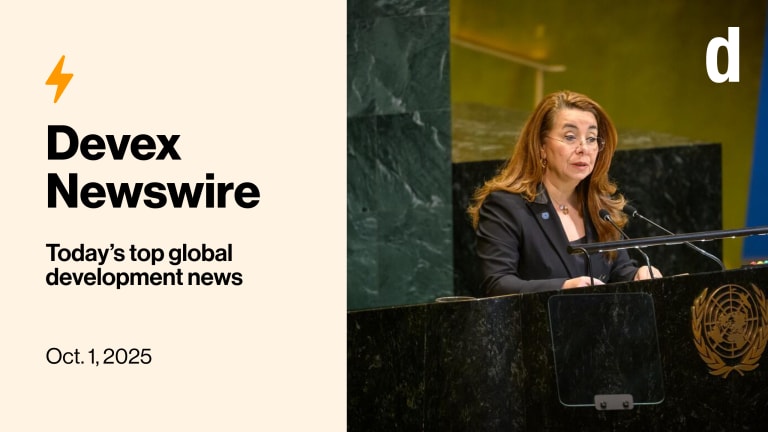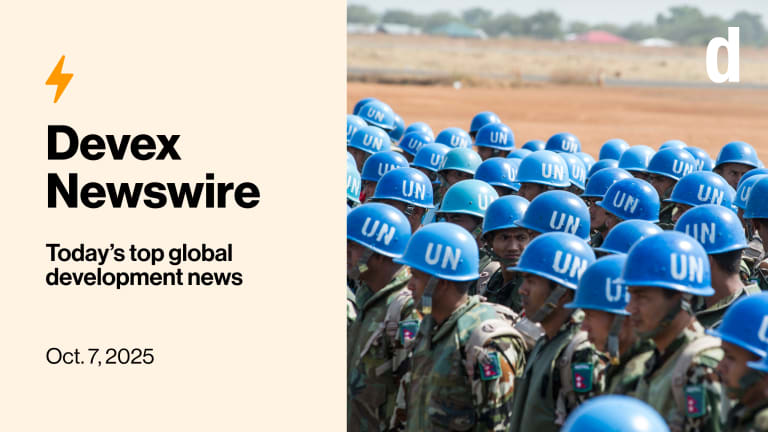Devex Newswire: Is the UN's Trump charm offensive just pointless pandering?
Presented by the Aga Khan Foundation

Is catering to U.S. President Donald Trump a recipe for success? One U.N. agency hopes so, though its contortionist campaign could also be a cautionary tale.
Also in today’s edition: USAID staff have been told they may need to come back to work in order to shut down their agency’s work. Yep, you heard that right.
+ Get expert insights on the proposed USAID-State Department merger. Join our live panel today to explore the benefits, downsides, and challenges. Save your spot now. This event is exclusively for Devex Pro members. If you’re not yet a Pro member, you can start your 15-day free trial.
Will he even care?
The International Organization for Migration is hugely reliant on its biggest donor, the United States, which hasn’t exactly been in a charitable mood lately. So the U.N. agency is bending over backward to show that it’s aligned with Trump’s “America First” agenda in the hopes of currying the administration’s financial favor.
This is a preview of Newswire
Sign up to this newsletter for an inside look at the biggest stories in global development, in your inbox daily.
In the past few weeks, IOM has feverishly scrubbed its website of references to diversity, equity and inclusion, and highlighted the work it does to facilitate the return home of refugees from Haiti and Latin America.
Will any of that matter to an administration that thrives on unpredictability and often ignores gestures of goodwill? The initial signs aren’t encouraging.
Since the Trump administration first announced its freeze on U.S. foreign aid, IOM has been forced to lay off 3,000 workers supporting the U.S. refugee resettlement program. More recently, the migration agency began dismissing some 20% of its staff at its headquarters in Geneva and an undisclosed number in the field. More layoffs are coming, my colleague Colum Lynch reports.
For many U.N. observers, the migration agency is the U.N.’s canary in the coal mine, a harbinger of how the draconian U.S. aid cuts will reverberate across the U.N. system in the coming weeks and months, Colum writes
“There are basically two schools of thought at the UN about how to handle Trump,” says Richard Gowan of the International Crisis Group. “One is that you can buy off the new administration with a bunch of reforms designed to cut costs and satisfy U.S. interests. The other is that the U.S. will simply pocket these reforms, and continue to bash the UN system regardless. The real underlying question is whether the U.S. wants to change the system or wreck the system and nobody knows the answer.”
Read: UN appeals fall flat in face of Trump's budget steamroller
Final, final mission
Nearly two weeks ago, USAID staff received a “final mission” notice that the agency’s entire workforce would be fired by either July 1 or Sept. 2. They were also told to give the agency their preferences for one of two options: Go on voluntary administrative leave during this timeframe or active duty to wind the agency down by Sept. 2.
But now, the guidance has shifted a bit, clarifying that the “default” position is to work to help shutter USAID, unless administrative leave has been approved, according to an email sent Thursday and seen by Devex. It also informed staff that they may be working in different roles to help with the wind down; and that even those on leave may be called back if needed.
The email said that winding down programs and personnel is now the primary goal of USAID leadership — i.e., staff’s “final mission” — and that employees are expected “to remain responsive to that mission throughout the duration of their employment.”
“There is a lot of work to do in the coming months, and staff may be required to work outside of their usual functional area on special projects and to accomplish specific tasks,” the email stated.
The messaging comes just over a week after the Trump administration shared documents with the U.S. Congress that contained a list of 5,341 terminated USAID programs and 898 active programs. The administration also outlined its plans to shutter USAID and merge it into the State Department.
Read: USAID staff told they may be called back to work to wind agency down
ICYMI: What's left, but more importantly, what's ahead for USAID? (Pro)
Bravery or bravado?
They say necessity is the mother of invention. For years, the global south has fought to stand on its own two feet, without the assistance of the global north. Now, necessity may turn that into a reality.
“There’s an optimism which isn’t blind to what’s happening,” Wawira Njiru, a Kenyan aid leader and CEO of Food4Education, told the Skoll World Forum, a conference for social entrepreneurs that took place in the U.K. county town of Oxford last week. “I am optimistic that African countries — and countries around the world — will step up.”
“We’re going to reorder the powers that be,” said Neera Nundy, an Indian American whose nonprofit, Dasra, supports other organizations in India. “It’s not going to be the global north that does it. It’s not going to be USAID. It’s going to be us.”
Some of the same optimism was shared by former staff and partners of USAID, even though the Trump administration has eviscerated its programs and effectively eliminated the agency.
“We have a blank sheet of paper,” said Gayle Smith, former USAID administrator, during another Skoll session. “I wouldn’t have wanted to acquire it, but we do have an opportunity to think differently about this space. If the era of foreign aid as we know it is over, how are we thinking about that for the future?”
Not everyone was putting on a happy face though.
“I read these comments saying Africans are better off without USAID,” said one delegate, who asked not to be named. “It’s just bravado, I’m afraid.”
Read: Will USAID cuts bring new opportunities for the global south?
+ Missed the 2025 Skoll World Forum? Don't worry! Our upcoming newsletter, arriving in just a few hours, delivers the key highlights straight to your inbox.
Worsening health
Necessity is also apparently the mother of desperate measures. And the World Health Organization is resorting to them as it prepares to slash its budget ambitions for the next two years in the wake of the U.S. quitting the world body.
In a recent presentation to member states, a copy of which was seen by Devex, preliminary figures for WHO’s financial outlook for 2026-2027 show a funding shortfall of over $1.8 billion, or a staggering 43% of its targeted budget.
WHO has suffered from perennial funding challenges, though the U.S. exit supercharged them, forcing belt-tightening measures such as a hiring freeze and travel reductions. More recently, however, it became clear those wouldn’t be enough, and WHO Director-General Tedros Adhanom Ghebreyesus confirmed there would be job cuts.
“Everything is on the table, including merging divisions, departments and units, and relocating functions,” he said in an email. “This reduction will begin at headquarters, starting with senior leadership, but will affect all levels and regions.”
Some WHO sources say they expect headquarters to be hardest hit, but it needs to be fair.
“We're being told HQ will take the brunt of the cuts, which is fine, but which parts of WHO? Those who've been bleeding over the past five years or so? Or those who've been ballooning?” a WHO official who spoke on condition of anonymity said.
Read: WHO grapples with deepening funding shortfall
+ For more content like this, sign up for Devex CheckUp, our free weekly global health newsletter.
One-two punch
Women make up 70% of the global health workforce. Now they’re facing double blowback — one from the ongoing aid cuts to global health, and two, the rollback of investments in gender equality.
“We ignore this unfortunate overlap at our own peril,” write Dr. Shubha Nagesh and Dr. Magda Robalo in an opinion piece for Devex.
“On one hand, women are being asked to do more with less as global health funding dwindles. On the other hand, they are facing systemic discrimination that limits their ability to advance and thrive in the profession,” they add.
The prominent doctors urge a renewed commitment to financing global health systems, along with funding to support the recruitment, retention, and leadership of women health workers.
“If we care about the sustainability of our health systems, it’s time to break the double bind for women health workers.”
Opinion: Women health workers face a double bind as aid dwindles
In other news
Three USAID employees were fired while in Myanmar on a rescue and recovery mission. [Reuters]
Low-income countries accuse wealthy nations of betraying climate pledges by resisting a proposed shipping emissions levy that could fund climate action in vulnerable regions. [The Guardian]
Aid cuts could reverse years of progress made in maternal health, a U.N. report reveals. [Arab News]
Sign up to Newswire for an inside look at the biggest stories in global development.
Search for articles
Most Read
- 1
- 2
- 3
- 4
- 5








